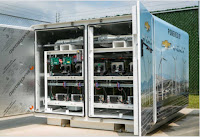But what you may not realize is that major EV makers — BMW, GM, Nissan, Toyota — are now exploring how much value their EV battery has for use in the electricity storage market after that battery can no longer meet the strict requirements for powering its car. This potential second life for EV batteries is a clean energy game changer for two reasons:
- These used EV batteries hold the promise of much cheaper electricity storage for renewables than is available today.
- If used EV batteries have value, then EV makers can charge less for their cars, making them even more affordable
We already knew electric cars hold the prospect of providing low-cost storage directly — during the 95 percent of the time the car is parked and the battery isn’t being used. Now imagine what the potential flood of hundreds of thousands — and ultimately millions — of second-life EV batteries into the electricity storage market will mean. Indeed, with hundreds of thousands of EVs already sold in the U.S., at least one company that purchases used EV batteries has indicated the price is an astounding $100 per kiloWatt-hour, far cheaper than anything on the market today.
The key point is that the battery is only useful in an EV as long as it retains the vast majority of its original storage capacity so it can provide the range and performance promised to the EV buyer. A typical EV battery lifetime might be 8 to 10 years. But after that point, the battery still has significant value for the far-less-demanding job of storing electric power.
Read more at Why Used Electric Car Batteries Could Be Crucial to a Clean Energy Future

No comments:
Post a Comment